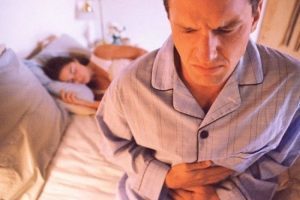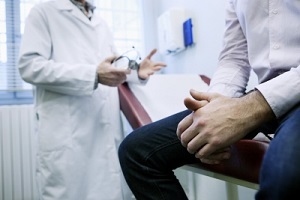
Prostate Inflammation> is a disease that mainly affects men between the ages of twenty and fifty-five. The older the man, the greater the risk of prostatitis.
With initial prostatitis, the functions of the gland are activated. Along with the appearance of inflammation, tissue regeneration occurs.
Let's talk in more detail about the first signs of prostatitis in men and their treatment.
How to recognize?
The onset of prostatitis is rarely unequivocally recognized, as it is sometimes asymptomatic and its symptoms are individual to each patient and change over time.
These functions include:
- A man has a little difficulty urinating in the toilet. The gland gradually enlarges, the urinary canal contracts.
- Patient loses interest in sex. Difficulties with arousal of the penis increase when trying to have sexual contact. Orgasm is difficult to achieve, or weakens, or disappears completely.
- Burning in the urethra, itching in the perineum.
- I often want to urinate, but it comes out drop by drop.
- Semen comes out quickly during intercourse with minimal pleasure.
- General fatigue, depression, irritability, aggressiveness, increased anxiety.
A man experiences weakness, his work capacity decreases.
Noise in my ears, echoing in my head.
In the morning, a person feels overwhelmed, loses initiative in life.
At the same time, at night, sometimes prolonged erection and painful ejaculation occur spontaneously, not associated with sexual intercourse.
Observing these phenomena, the patient calms down, believing that he is fine with potency, the problems, in his opinion, are connected with the partner, their relationship. He suffers from depression, which aggravates the development of the disease.
The first signs of prostatitis in a man
There is a clear difficulty for the doctor and the patient to relate these symptoms to prostate disease. They can be caused by experienced stress (especially if there are reasons), with a conflict in personal life.
They are more safely associated with early prostatitis if other symptoms appear:
- Patient experiences pain in groin, balls, perineum, lower back.
- With prostatitis, frequent urination, especially at night, this process is becoming more and more painful, the result of attempts to empty the bladder is less and less significant.
- Mucus discharge from the urethra begins.
The symptoms of the first prostatitis slowly accumulate for a year, two, three. Worst of all, they have the character of a chain reaction: due to the growth of negative phenomena in the prostate gland, a man not only does not find satisfaction for himself, but is also unable to satisfy his sexual partner.
Due to this, sexual intercourse is less and less frequent, causing stagnation of blood circulation in the pelvic area. Such stagnation, in turn, is one of the causes of prostatitis.
Acute prostatitis differs in symptomatology from chronic.
Its attributes:
- The temperature for no apparent reason sometimes rises to 38-39 degrees, with parenchymal prostatitis, up to 40 ° C.
- Dysuria reaches the point of not being able to urinate.
- The perineal pain becomes especially severe.
- Patient suffers chills, experiences nausea before vomiting.
- I have trouble defecating.
What to do?
In chronic inflammation, pain is mild, appears and disappears periodically in the perineum, is administered in the lumbar area, pubis. Excessive sweating, especially in the perineum.
Sexual dysfunction becomes permanent. Instead of urine for prostatitis in the morning, prostate discharge is secreted. The pain is mostly painful, extending to the sacrum, suprapubic, rectum, penis.
The rate of development of sexual disorders depends on the degree of participation in the pathology process of the seminal tubercle, seminal vesicles located next to the prostate. With a prolonged course of the initial stage of prostatitis in men, the intensity of the production of sex hormones decreases.
Young men in these cases often panic and fear sexual intercourse. Fear of "dishonor", not being able to perform necessary actions with a partner leads to neurosis, which further worsens sexual function.
Sexual disorders occur when there is an excess of female hormones in a man's body, a lack of male hormones. They can also be the result of previously unidentified asymptomatic hidden inflammation of the prostate. Its development sometimes leads to male infertility.
If you find the first signs of prostatitis, what to do? When these signs appear, it is necessary to make an appointment with a urologist, who will send the patient for tests, based on his results, diagnose (or not) the disease, its type.
The identification of the ethology of prostatitis: bacterial or not is also of utmost importance for the choice of the treatment method. Treating non-infectious prostatitis with antibiotics, for example, is not only useless, it is also very harmful to the body.

First aid for prostatitis will be provided by a doctor. Aims to restore normal urination with prostatitis. To do this, it is urgently necessary to reduce the size of the prostate gland, which compresses the urethral canal and does not leak urine.
Relaxation of the gland muscles can be achieved, for example, by massaging the prostate.
Prostate massage is a procedure that requires special qualifications from a masseur.
Its execution by an amateur is fraught with serious complications, irreversible damage to internal organs.
For the treatment of bacterial prostatitis, a course of antibiotics, rectal suppositories is prescribed. It should be understood that harmful microorganisms cannot be killed by home remedies, exercise, physical procedures, and diet.
These methods will help or be needed during the referral.
At the same time, for the treatment of bacterial prostatitis, their combination may be enough for a complete cure without "chemistry", that is, pharmacy drugs. It all depends on the stage of the disease, the individual characteristics of the patient's body, the experience of the doctor.
If the disease has left the exacerbation stage, there is no more infection, the patient should be cured as soon as possible:
- start a normal sex life as soon as possible;
- eliminate bad habits. Eat a diet for patients with prostatitis;
- move more, play sports. Do special exercises for men.
What other diseases are there with these symptoms?
The symptoms described do not necessarily indicate that the disease is prostatitis. They also accompany kidney diseases, infections of the urethra, venereal diseases and others.
Urethritis is the most common male disease. This is an infection in the urethra caused by bacteria, viruses, and fungi. They are mainly infected through sexual contact.
Sometimes an infection waits for a convenient hour in the body and manifests itself when the immune system is weakened. The reasons for its decrease are the same as those that provoke non-bacterial prostatitis: hypothermia, bad habits, chaotic sexual behavior, abuse of acidic, spicy, salty foods, stress, physical activity.
What exactly is inflamed: the prostate or urethra (or both), will be shown by tests, ultrasound examination. On the basis of the doctor will give a diagnosis.
Now you know the first symptoms of prostatitis in men and their treatment. As with any disease, the sooner prostatitis is found, the sooner it will be cured.
Neglecting the first signs of prostatitis and treatment brings frivolous patients to the surgeon's table. It is better to act in a timely manner.


























